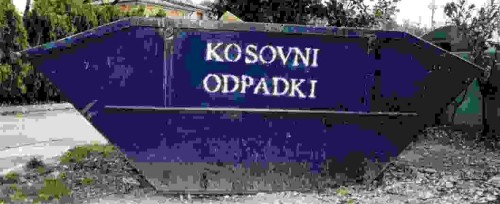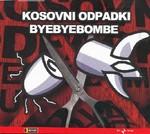
They sing in Friulian, Slovene, Italian, and Spanish. And, they want to recover what others throw away. We met with Mauro "Puntar" Punteri, singer of the Gorizian band Kosovni Odpadki
Translation for Osservatorio Balcani: Risto Karajkov
Kosovni Odpadki, let's start with the name...
Kosovni Odpadki are Slovenia's big, usually blue, garbage containers used for bulky trash items, such as old furniture, TV sets, chairs, cupboards.... It seemed an interesting idea to choose a name in Slovene, a language of the city of Gorizia and to refer to the trash. Much of what is thrown away can be reused. This is also true with music, in our view.
You use different languages in your lyrics, Friulian, Slovene, Spanish, Italian. How much do you identify with these languages?
Using the languages spoken around here, and which we more or less speak, seemed quite natural. I say "more or less" because the disputes over the languages in Gorizia involve those who would like a pure language and those who prefer a language more or less mixed with other languages. We most identify with the Friulian and Italian languages, since everybody in the band is Italian. Nevertheless, we also frequently use Slovene. Some songs are done in Spanish, and this language, because of personal issues, is also very familiar to us.
You have started working together before Slovenia's entry into the EU. How did Gorizia change after the fall of the border? In your garbage bins, what would you keep and what would you throw away?
This is a dangerous question. In a provocative sense, nothing has changed in Gorizia. I personally have a love-hate relationship with this city, as probably many of us do with their places of birth. Many times, I miss it; other times, I run away. Gorizia is a place where things pass by; changes are not being observed, or anyway, they are observed late. Even before the barrier fell, thousands have passed through. Migrants, people pursuing something better. Seven years ago, their entry into the West was exactly here. According to police estimates, approximately 18,000 people have crossed annually. Nothing of this remained in Gorizia. Sometimes we seem to be in a riverbed, but without fish, algae, without life... a paved riverbed, where water flows through carrying the living, the dead, the leftovers, without leaving anything behind.
However, it seems the climate is lighter. The disappearance of the border seems to have taken away some weight...
If there is one positive thing, it is that this border has never been insurmountable. For those who lived here, it was always permeable. We had, for example, the possibility to cross through many border crossings. Even despite this, the older generations still perceive as a difficulty, the relationship with "the other side". It is different for young people. They are more use to crossing the border, also because of tools such as the Internet. In addition, there are many opportunities. Ljubljana is only 100 kilometres away and, from a musical point of view, many interesting things are happening there. I mean...Nick Cave plays there; and young people start to realise it.
The linguistic issue is separate. My father was Italian, my mother Slovene, and my fiancé and future wife is Argentinean. For me, it is normal to express myself in all of these languages. However, for others, there seem to be barriers between one language and another. This old concept that there should be stark differences between languages still dominates. However, this is not true, and also, there are no clear limits within one sole language. The Slovene, which we use, is not the same language used in Ljubljana. It is the one used in the nearby hills, spoken by the Slovene villagers when they harvest their vineyards, 50 metres away from the Italian farmers.
You often refer to the "Yugo" in your lyrics. What is your relationship to this country that no longer exists?
As far as I am concerned, Yugoslavia is simply a part of my existence. Although I never ask myself what would have happened if it still existed or if it never existed. My mother is Slovene, with many relatives on the other side. For me, it was very normal to go and visit them at least once a day. Then, I had an uncle who was an architect in Belgrade, whom I visited regularly. For many others in Gorizia, it was very normal to cross the border, even if only to do the shopping, to buy some supplies or to fill the tank with gas.
We do not feel nostalgic about it, however. Perhaps we see it with the love you feel for something which is yours even though it gives you pain. This emerges from a song written together with Roberto Dobran. Roberto had to flee his country in 1991 and move to Gorizia.
There are also some references to the struggle for liberation...
In the song Lidi ma caje, we tell the story of two women partisans. The choices made by these two women seemed important to us. Indirectly, the song also deals with the relationship between Italians and Slovenes during the liberation war. This topic is frequently debated even today. In many ways, we share a common struggle, but also with aspects and aspirations substantially different.
After the album Byebyebombe from 2004, you are now working on a new CD, and you already have a single, KO2...
KO2 wants to be a bridge between what Kosovni are at present and what they want to become. The first album was quite focused on the linguistic aspect. Continuing along this way would, however, be backsliding. Communication in this region will naturally be in Slovene, Italian, and Friulian.
Gorizia's revival is presently, as at a gambling table, not about using the traditional languages, but about underscoring communication between people. To dare, to attempt to combine even more, to try to be even more provocative for a simple motive: even these languages, which in our point of view are very personal, after having won the battle for their legitimacy, have become languages of power. New languages have created still further small spaces of power: this goes for the Slovene but also for the Friulian.
Hence, in order to bypass, if not to destroy these new barriers, you have to perhaps try to use them differently. Why should you only speak Slovene if you could put in one song four words of Slovene and five words of Serbo-Croatian? From a musical point of view however, we have perhaps moved away from the folk sentiment in order to rediscover rock traditions.









